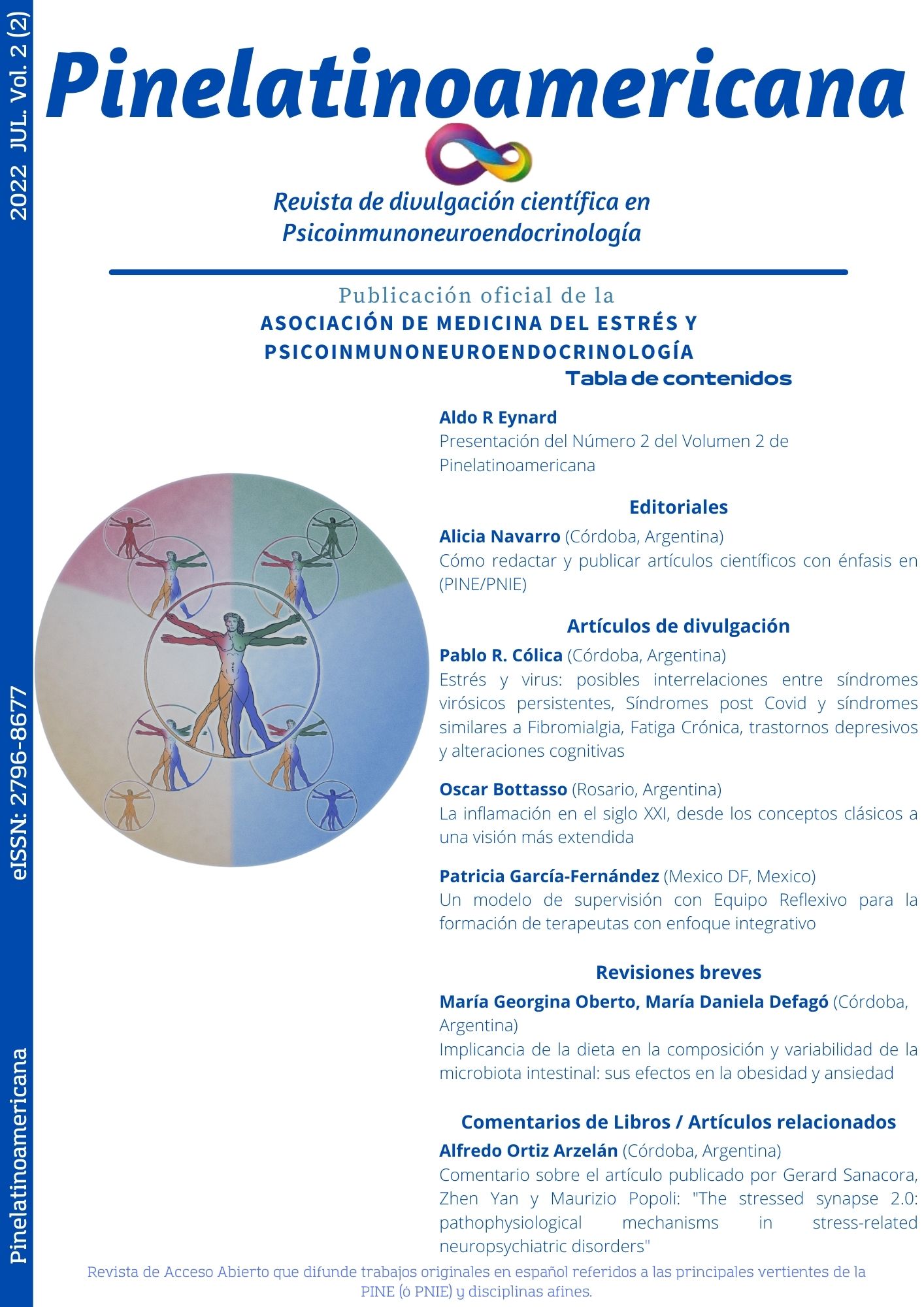Abstract
The article refers to the various mechanisms that trigger the inflammatory response and the consequences that usually occur when the noxious agent is not cleared leading to the perpetuation of the process, which is linked to the interconnection between the major systems of the body: immune, endocrine and the autonomic nervous system. In line with the most recent research, a new approach is also offered where inflammation becomes a response aimed at restoring homeostasis. One facet deals with excessive deviations of cellular processes, unable to be controlled by regulatory mechanisms, which has some, but not all the features of the classic response, namely para or metaflammation. On the other hand, the traditional inflammation, which, although it may be related to this phenomenon, is particularly linked to the response to pathogens, toxins, or other agents that cannot be regulated, but are equally life-threatening.
References
Andhavarapu, S., Mubariz, F., Arvas, M., Bever, C., Jr, y Makar, T. K. (2019). Interplay between ER stress and autophagy: A possible mechanism in multiple sclerosis pathology. Experimental and molecular pathology, 108, 183–190. https://doi.org/10.1016/j.yexmp.2019.04.016
Brewer, S. M., Brubaker, S. W., y Monack, D. M. (2019). Host inflammasome defense mechanisms and bacterial pathogen evasion strategies. Current opinion in immunology, 60, 63–70. https://doi.org/10.1016/j.coi.2019.05.001
Dantzer R. (2009). Cytokine, sickness behavior, and depression. Immunology and allergy clinics of North America, 29(2), 247–264. https://doi.org/10.1016/j.iac.2009.02.002
Das, U. N., (2022). Papel de los Lípidos Bioactivos en Psiquiatría, Inmunología, Neurología y Endocrinología (PINE). Pinelatinoamericana, 2(1), 56–81. https://revistas.unc.edu.ar/index.php/pinelatam/article/view/37046
D'Attilio, L., Santucci, N., Bongiovanni, B., Bay, M. L., y Bottasso, O. (2018). Tuberculosis, the Disrupted Immune-Endocrine Response and the Potential Thymic Repercussion As a Contributing Factor to Disease Physiopathology. Frontiers in endocrinology, 9, 214. https://doi.org/10.3389/fendo.2018.00214
Evans, W. J., Morley, J. E., Argilés, J., Bales, C., Baracos, V., Guttridge, D., Jatoi, A., Kalantar-Zadeh, K., Lochs, H., Mantovani, G., Marks, D., Mitch, W. E., Muscaritoli, M., Najand, A., Ponikowski, P., Rossi Fanelli, F., Schambelan, M., Schols, A., Schuster, M., Thomas, D., Wolfe, R y Anker, S. D. (2008). Cachexia: a new definition. Clinical nutrition (Edinburgh, Scotland), 27(6), 793–799. https://doi.org/10.1016/j.clnu.2008.06.013
Ganeshan, K., y Chawla, A. (2014). Metabolic regulation of immune responses. Annual review of immunology, 32, 609–634. https://doi.org/10.1146/annurev-immunol-032713-120236
González, F. B., Villar, S. R., Pacini, M. F., Bottasso, O. A., y Pérez, A. R. (2020). Immune-neuroendocrine and metabolic disorders in human and experimental T. cruzi infection: New clues for understanding Chagas disease pathology. Biochimica et biophysica acta. Molecular basis of disease, 1866(3), 165642. https://doi.org/10.1016/j.bbadis.2019.165642
Hotamisligil G. S. (2006). Inflammation and metabolic disorders. Nature, 444(7121), 860–867. https://doi.org/10.1038/nature05485
Kotas, M. E., y Medzhitov, R. (2015). Homeostasis, inflammation, and disease susceptibility. Cell, 160(5), 816–827. https://doi.org/10.1016/j.cell.2015.02.010
Kusminski, C. M., Bickel, P. E., y Scherer, P. E. (2016). Targeting adipose tissue in the treatment of obesity-associated diabetes. Nature reviews. Drug discovery, 15(9), 639–660. https://doi.org/10.1038/nrd.2016.75
Man, S. M., Karki, R., y Kanneganti, T. D. (2017). Molecular mechanisms and functions of pyroptosis, inflammatory caspases and inflammasomes in infectious diseases. Immunological reviews, 277(1), 61–75. https://doi.org/10.1111/imr.12534
Medzhitov R. (2021). The spectrum of inflammatory responses. Science (New York, N.Y.), 374(6571), 1070–1075. https://doi.org/10.1126/science.abi5200
Matsuzawa-Ishimoto, Y., Hwang, S., y Cadwell, K. (2018). Autophagy and Inflammation. Annual review of immunology, 36, 73–101. https://doi.org/10.1146/annurev-immunol-042617-053253
Palmer, C. S., Ostrowski, M., Balderson, B., Christian, N., y Crowe, S. M. (2015). Glucose metabolism regulates T cell activation, differentiation, and functions. Frontiers in immunology, 6, 1. https://doi.org/10.3389/fimmu.2015.00001
Rohm, T. V., Meier, D. T., Olefsky, J. M., y Donath, M. Y. (2022). Inflammation in obesity, diabetes, and related disorders. Immunity, 55(1), 31–55. https://doi.org/10.1016/j.immuni.2021.12.013
Russell, D. G., Huang, L., y VanderVen, B. C. (2019). Immunometabolism at the interface between macrophages and pathogens. Nature reviews. Immunology, 19(5), 291–304. https://doi.org/10.1038/s41577-019-0124-9
Sugimoto, M. A., Vago, J. P., Perretti, M., y Teixeira, M. M. (2019). Mediators of the Resolution of the Inflammatory Response. Trends in immunology, 40(3), 212–227. https://doi.org/10.1016/j.it.2019.01.00 7
Takeuchi, O., y Akira, S. (2010). Pattern recognition receptors and inflammation. Cell, 140(6), 805–820. https://doi.org/10.1016/j.cell.2010.01.022
Talbot, S., Foster, S. L., y Woolf, C. J. (2016). Neuroimmunity: Physiology and Pathology. Annual review of immunology, 34, 421–447. https://doi.org/10.1146/annurev-immunol-041015-055340
Zindel, J., y Kubes, P. (2020). DAMPs, PAMPs, and LAMPs in Immunity and Sterile Inflammation. Annual review of pathology, 15, 493–518. https://doi.org/10.1146/annurev-pathmechdis-012419-032847

This work is licensed under a Creative Commons Attribution-NonCommercial 4.0 International License.
Copyright (c) 2022 Pinelatinoamericana

